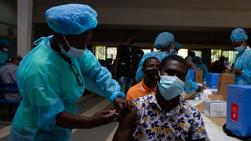 Nurses administer jabs as Angolans queue to receive a COVID-19 vaccination in Luanda on Oct 1, 2021. (OSVALDO SILVA / AFP)
Nurses administer jabs as Angolans queue to receive a COVID-19 vaccination in Luanda on Oct 1, 2021. (OSVALDO SILVA / AFP)
LONDON / BERLIN / RIO DE JANEIRO / WASHINGTON / LJUBLJANA / AMSTERDAM / NAIROBI / KYIV - Death rates from COVID-19 infections are much higher in patients with diabetes in Africa, where the number of people with diabetes is growing rapidly, the World Health Organization said on Thursday.
A WHO analysis of data from 13 African countries found a 10.2 percent case fatality rate in COVID-19 patients with diabetes, compared with 2.5 percent for COVID-19 patients overall.
"COVID-19 is delivering a clear message: fighting the diabetes epidemic in Africa is in many ways as critical as the battle against the current pandemic," said Matshidiso Moeti, WHO Regional Director for Africa, in a statement.
An estimated 70 percent of people with diabetes on the continent were unaware they had disease, according to the WHO.
The number of people with diabetes in Africa is expected to surge to 55 million by 2045 from 24 million this year, the International Diabetes Federation forecasts.
The data from Africa on the increased vulnerability of people with diabetes to death from COVID-19 reflects a global trend. A Reuters investigation this year reported that the pandemic has revealed that the United States has been losing its public health battle against diabetes for more than a decade.
As of Thursday, Africa has recorded over 8.6 million confirmed COVID-19 cases and 220,0000 deaths, according to a Reuters tally.
Less than 7 percent of the African population is fully vaccinated against COVID-19, compared with about 40 percent globally, WHO says.
ALSO READ: EU to buy up to 60m Valneva COVID-19 shots
Brazil
Brazil on Wednesday registered 280 more deaths from COVID-19 over the past 24 hours, raising the national death toll to 610,036, said the Health Ministry.
Authorities also registered 12,273 new daily COVID-19 cases, bringing the total caseload to 21,909,298.
Brazil has seen an average of 257 deaths and 10,502 new cases per day in the last week.
The South American country currently has a rate of 290.3 deaths and 10,425.7 cases per 100,000 inhabitants, according to the ministry.
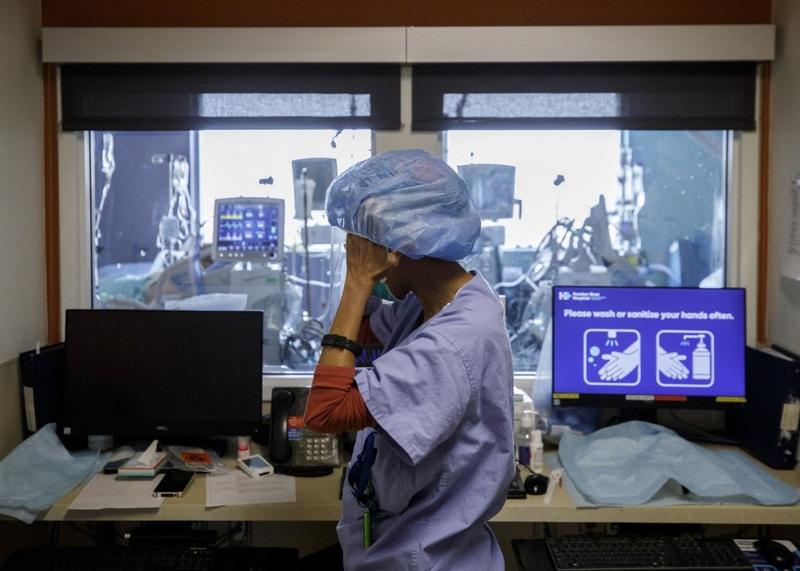 In this file photo taken on April 29, 2021,
a healthcare worker dons a bouffant cap as staff treat patients suffering from coronavirus disease at Humber River Hospital's Intensive Care Unit in Toronto.
(COLE BURSTON / AFP)
In this file photo taken on April 29, 2021,
a healthcare worker dons a bouffant cap as staff treat patients suffering from coronavirus disease at Humber River Hospital's Intensive Care Unit in Toronto.
(COLE BURSTON / AFP)
Canada
Political leaders in Ontario, Canada have suspended a plan to lift restrictions on the number of people who can congregate in restaurants, bars and other settings, saying a cautious approach was needed with a rise in COVID-19 infections.
Ontario government officials had set Nov 15 as the date they would lift capacity limits in so-called "high-risk settings" that also include night clubs, dance halls and strip clubs.
The officials said a recent increase in the number of reported COVID-19 infections had been noted with the onset of winter, although the province has some of the lowest case numbers in Canada.
"To protect our hard-fought progress and ensure we can continue to manage COVID-19 for the long-term, more time is needed before we can take the next step forward in our reopening plan," government officials said in a written statement.
The government and province chief medical officer would monitor case data for the next 28 days to determine when the capacity limits could be lifted, the statement said.
Denmark
Denmark will impose self-isolation requirements on travelers from Singapore, its embassy in the city-state said on Thursday, following a surge in COVID-19 infections.
Singapore was removed this week from a European Union list of non-EU countries for which travel restrictions should be lifted.
"Singapore is now considered a high risk country for travel to Europe," the embassy of Denmark in Singapore posted on Facebook.
EU
Europe's drug regulator on Thursday recommended adding a rare type of spinal inflammation called transverse myelitis as a side-effect of Johnson & Johnson's single-dose COVID-19 vaccine.
Reports of this serious neurological illness was also at the heart of trial halts in the early stages of development for both AstraZeneca and J&J's shots, which are based on similar technology.
Giving updates on the safety of all coronavirus shots, the European Medicines Agency (EMA) said it was assessing reports of a rare blood condition known as capillary leak syndrome (CLS) following inoculation with Moderna's vaccine.
The EMA said it had recorded six cases of CLS and was assessing all data, but it was not yet clear if there was a causal association between the reports and the vaccine.
In CLS, fluids leak from the smallest blood vessels causing swelling and a drop in blood pressure. The condition has also been studied with vaccines from AstraZeneca and J&J.
The EMA said there was currently not enough evidence of a possible link between rare cases of multisystem inflammatory syndrome (MIS) and mRNA-based vaccines from Moderna and Pfizer-BioNTech.
The regulator is reviewing if approved coronavirus vaccines could cause MIS. The syndrome is a serious but rare condition in which different body parts become inflamed, including the heart, lungs, kidneys, brain, skin, eyes, or gastrointestinal organs.
J&J and Moderna did not immediately respond to requests for comments.
Italy
Italy, one of the first nations to be hit hard by the coronavirus, will offer a booster dose to all citizens in the 40-60 age group from Dec 1, Health Minister Roberto Speranza told lawmakers on Wednesday.
As of Wednesday, 83.7 percent of Italian residents have completed the vaccine cycle, he said. Booster shots are already available in Italy for vulnerable citizens, medical staff, people over age 60 and those who have previously received a Johnson & Johnson vaccine.
 In this file photo taken on April 16, 2021,
a doctor (2nd right) takes a swab sample from a man to test for COVID-19 at a testing station inside a pub in Berlin’s Friedrichshain district. (TOBIAS SCHWARZ / AFP)
In this file photo taken on April 16, 2021,
a doctor (2nd right) takes a swab sample from a man to test for COVID-19 at a testing station inside a pub in Berlin’s Friedrichshain district. (TOBIAS SCHWARZ / AFP)
Germany
The daily number of COVID-19 cases in Germany has reached a new all-time high, with 39,676 cases registered in one day, the Robert Koch Institute said on Wednesday.
The seven-day incidence rate also rose to 232.1 per 100,000 inhabitants, peaking for the third day in a row, according to the German disease control and prevention agency.
According to the German Intensive Care Availability Register, the number of COVID-19 patients requiring treatment in intensive care units reached 2,739 on Wednesday.
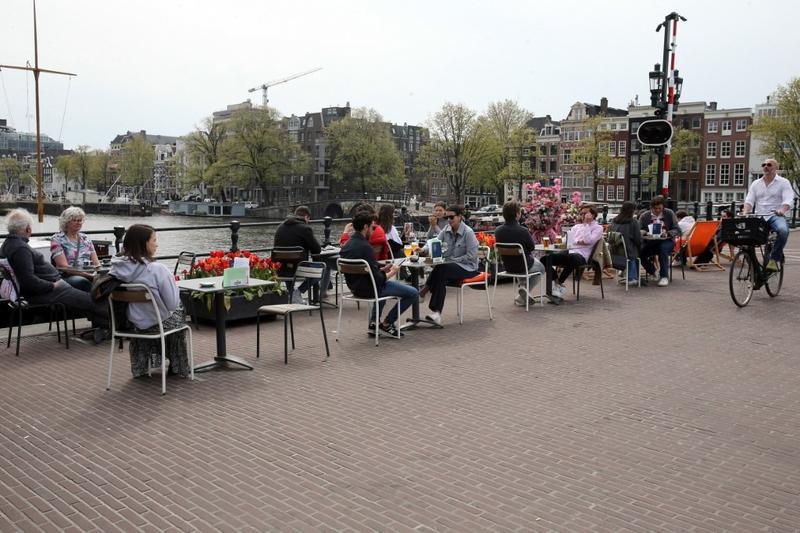 In this file photo taken on April 28, 2021,
customers sit on a terrace alongside a canal in Amsterdam, on April 28, 2021, as the Dutch government eased the restrictions put in place to curb the spread of COVID-19. (FRANCOIS WALSCHAERTS / AFP)
In this file photo taken on April 28, 2021,
customers sit on a terrace alongside a canal in Amsterdam, on April 28, 2021, as the Dutch government eased the restrictions put in place to curb the spread of COVID-19. (FRANCOIS WALSCHAERTS / AFP)
The Netherlands
The main Dutch pandemic expert advisory panel recommended on Thursday imposing Western Europe's first partial lockdown since the summer, putting pressure on the government to take drastic and unpopular action to fight a COVID-19 surge.
Caretaker Prime Minister Mark Rutte's government is expected to take a decision on Friday on new measures following the recommendation of the Outbreak Management Team, a panel of experts, broadcaster NOS reported.
Among measures under consideration were the cancellation of events, closing theatres and cinemas, and earlier closing times for cafes and restaurants, the NOS report said. Schools would remain open.
The government often, but not always, follows the panel's recommendations.
The Netherlands has so far provided booster shots only to a small group of people with weak immune systems. Despite an adult vaccinate rate nearing 85 percent, hospitals in parts of the Netherlands have been forced to scale back regular care to treat coronavirus patients.
Remdesivir
Resistance to Gilead Sciences Inc’s antiviral Remdesivir was found in coronavirus samples collected from an immune-compromised patient treated with the drug for a persistent COVID-19 infection, researchers said.
Similar mutations causing resistance have been generated in lab studies, but haven’t been previously reported in patients treated with the injectable medicine, Shiv Gandhi, Akiko Iwasaki and colleagues at the Yale University School of Medicine said
Similar mutations causing resistance have been generated in lab studies, but haven’t been previously reported in patients treated with the injectable medicine, Shiv Gandhi, Akiko Iwasaki and colleagues at the Yale University School of Medicine said. The patient, a woman in her 70s who had been treated for non-Hodgkin’s lymphoma, caught COVID-19 in May 2020. Remdesivir helped alleviate symptoms, but wasn’t able to completely clear the infection. It persisted for several months, affecting her sense of smell.
Genetic analysis of the virus showed that it acquired a mutation during treatment that appeared to reduce the effectiveness of the drug, the first cleared for COVID-19. The infection was successfully treated with monoclonal antibody therapy, which also led to a recovery of her sense of smell.
“While the finding is limited to a single case and requires confirmation of its generalizability in larger patient populations, it suggests that Remdesivir can impart selective pressure” in patients to drive evolution of the virus, the researchers said in a study, which was released on medRxiv ahead of peer-review and publication.
The scientists found the mutation, called E802D, reduced the fitness of the SARS-CoV-2 virus that causes COVID-19. They said the case illustrates the importance of monitoring for Remdesivir resistance and the potential benefit of using a combination of therapies in immunocompromised patients.
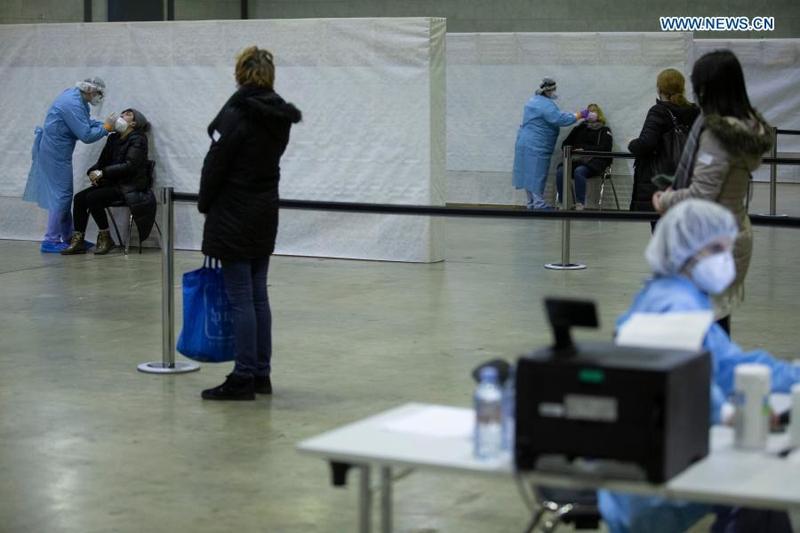 In this file photo taken on Jan 25, 2021,
teachers wait in line to receive COVID-19 tests at the Exhibition and Convention Centre in Ljubljana, Slovenia. (ZELJKO STEVANIC / XINHUA)
In this file photo taken on Jan 25, 2021,
teachers wait in line to receive COVID-19 tests at the Exhibition and Convention Centre in Ljubljana, Slovenia. (ZELJKO STEVANIC / XINHUA)
Slovenia
The Slovenian government and trade unions on Wednesday inked an agreement that will raise the wages of nurses and other health workers as the COVID-19 epidemic rages in the country.
"There is a lack of health workers and they are overloaded," Health Minister Janez Poklukar said in a statement. "They should get a fair payment for their work."
On Tuesday, Slovenia recorded 4,481 new COVID-19 cases, up from 3,344 cases the day before, the National Institute of Public Health reported. The highest daily number was recorded on Nov. 3, with 4,511 new cases.
According to the new agreement, about 35,000 health workers will receive higher wages, with the biggest increase going to hospital nurses.
The pay rises, unofficially ranging from 4 percent to 25 percent, will become effective after collective bargaining agreements are signed, according to the Slovenian Press Agency.
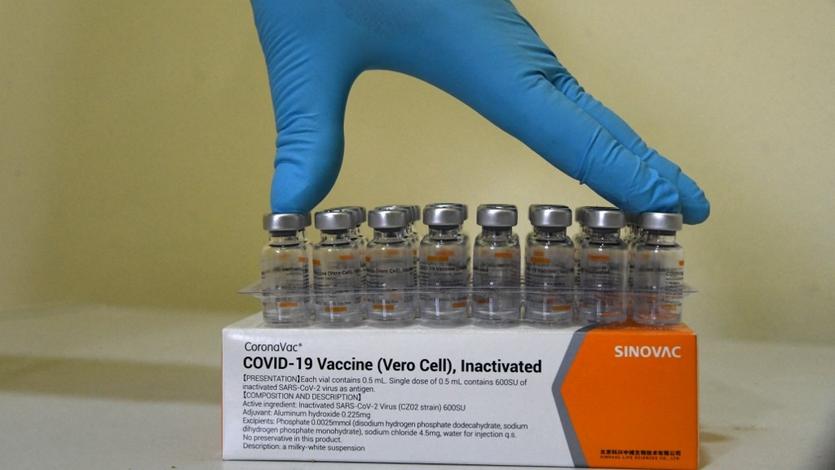 In this file photo taken on Oct 19, 2021, a medical worker holds a vial of the Sinovac vaccine during a vaccination drive against COVID-19 in the Syrian town of Jandairis.
(RAMI AL SAYED / AFP)
In this file photo taken on Oct 19, 2021, a medical worker holds a vial of the Sinovac vaccine during a vaccination drive against COVID-19 in the Syrian town of Jandairis.
(RAMI AL SAYED / AFP)
UK
The British government said it would recognize COVID-19 vaccines on the World Health Organization's Emergency Use Listing later this month, adding China's Sinovac and Sinopharm Beijing vaccines to the country's approved list of vaccines for inbound travelers.
The change, which will come into force from Nov 22, means travelers who have received these two jabs will be considered fully vaccinated in Britain.
India's Covaxin is also included in Britain's updated list of approved vaccines.
Passengers arriving in Britain after having been fully vaccinated and having received their vaccine certificate from one of more than 135 approved countries and territories are no longer required to take a pre-departure test, a day eight test or self-isolate upon arrival.
Those who have proof of vaccination from a country or territory that is not on the list, or with a vaccine that is not listed, must follow the rules for people who do not qualify as fully vaccinated.
The approved vaccines list currently includes Pfizer BioNTech, Oxford AstraZeneca (including Covishield), Moderna and Janssen.
Ukraine
Ukraine's health ministry has proposed expanding the list of occupations for which COVID-19 vaccinations will be compulsory to cover medical personnel and municipal employees, it said on Thursday.
The government already obliges teachers and employees of state institutions and local governments to receive vaccinations, without which they face being suspended from work.
The new list of roles that will require vaccination will include medical staff, municipal workers and employees of municipal companies, health minister Viktor Lyashko said.
Ukraine has registered record coronavirus cases and deaths in recent weeks, and the government has imposed strict lockdowns and promoted vaccination in an attempt to fight back.
The ministry has registered 3.16 million cases and 74,857 deaths since the start of the pandemic.
But Ukraine is one of several countries in eastern Europe with vaccination rates among the continent's lowest. Only around 8.3 million in a population of 41 million are fully vaccinated.
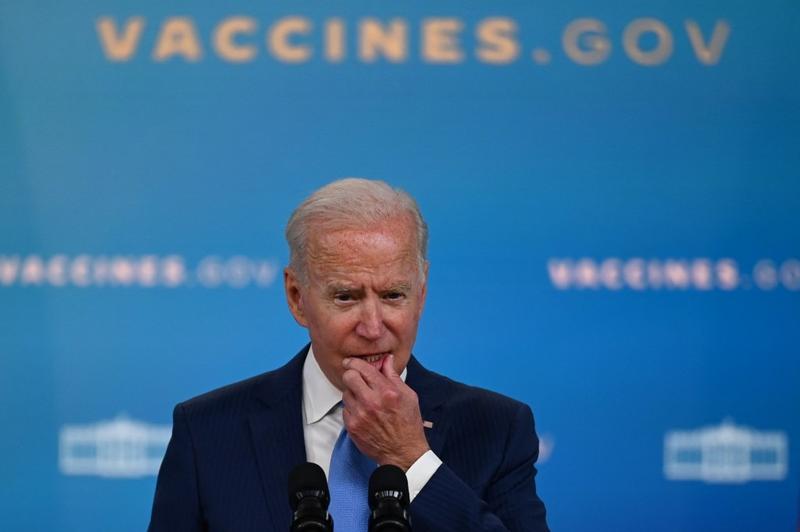 In this file photo taken on Aug 23, 2021, US President Joe Biden speaks about the COVID-19 response and the vaccination program at the White House in Washington, DC. (JIM WATSON / AFP)
In this file photo taken on Aug 23, 2021, US President Joe Biden speaks about the COVID-19 response and the vaccination program at the White House in Washington, DC. (JIM WATSON / AFP)
US
Ten Republican state attorneys general sued on Wednesday to stop the Biden administration's requirement that millions of US health workers get vaccinated against the coronavirus, saying it would worsen staff shortages.
US President Joe Biden, a Democrat, said last Thursday he will enforce the mandate starting Jan 4.
The attorneys general of Missouri, Nebraska, Arkansas, Kansas, Iowa, Wyoming, Alaska, South Dakota, North Dakota, and New Hampshire jointly filed a lawsuit in the US District Court for the Eastern District of Missouri in St Louis.
"Placing this additional mandate on healthcare facilities and employees will exacerbate this problem and will likely lead some facilities – particularly those in underserved, rural areas – to close due to an inability to hire sufficient staff," Kansas Attorney General Derek Schmidt said in a statement.
The lawsuit said the federal mandate intruded on states' police power and is unlawful under the Administrative Procedures Act because there was no comment period before its release.
On Nov 4, the Centers for Medicare & Medicaid Services, the regulator for the two federal health programs, issued an interim final rule it said covers over 10 million people and applies to around 76,000 healthcare providers including hospitals, nursing homes, and dialysis centers.
An interim final rule is effective immediately without the standard comment period that follows publication. There is a 60-day comment period following its publication, however.
Providers that fail to comply with the mandate could lose access to Medicare and Medicaid funds. Medicare serves people 65 and older and the disabled. Medicaid serves the poor.
The lawsuit said the CMS rule was heavy handed and did not take local factors and conditions into account.
Meanwhile. over 900,000 US children aged 5 to 11 are expected to have received their first COVID-19 shot by the end of Wednesday, the White House said, as the government ramped up vaccinations of younger children.


